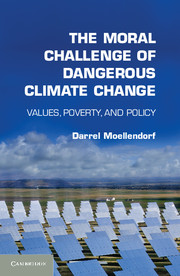Book contents
- Frontmatter
- Dedication
- Contents
- Acknowledgments
- Introduction
- 1 Danger, Poverty, and Human Dignity
- 2 The Value of Biodiversity
- 3 Risks, Uncertainties, and Precaution
- 4 Discounting the Future and the Morality in Climate Change Economics
- 5 The Right to Sustainable Development
- 6 Responsibility and Climate Change Policy
- 7 Urgency and Policy
- Afterword Frankenstorms
- Appendix A The Antipoverty Principle and the Non-Identity Problem
- Appendix B Climate Change and the Human Rights of Future Persons: Assessing Four Philosophical Challenges
- Appendix C The Right to Sustainable Development versus International Paretianism
- Appendix D Declaration on Climate Justice
- Bibliography
- Index
- References
3 - Risks, Uncertainties, and Precaution
Published online by Cambridge University Press: 05 June 2014
- Frontmatter
- Dedication
- Contents
- Acknowledgments
- Introduction
- 1 Danger, Poverty, and Human Dignity
- 2 The Value of Biodiversity
- 3 Risks, Uncertainties, and Precaution
- 4 Discounting the Future and the Morality in Climate Change Economics
- 5 The Right to Sustainable Development
- 6 Responsibility and Climate Change Policy
- 7 Urgency and Policy
- Afterword Frankenstorms
- Appendix A The Antipoverty Principle and the Non-Identity Problem
- Appendix B Climate Change and the Human Rights of Future Persons: Assessing Four Philosophical Challenges
- Appendix C The Right to Sustainable Development versus International Paretianism
- Appendix D Declaration on Climate Justice
- Bibliography
- Index
- References
Summary
“It is a world of change in which we live, and a world of uncertainty. We live only by knowing something about the future; while the problems of life, or of conduct at least, arise from the fact that we know so little.”
– Frank H. KnightClimate change poses risks of catastrophic changes to human communities and ecosystems. Left unmitigated, the risks of climate change are dangerous, in particular to persons who will be made especially vulnerable by the conspiracy of poverty and geography: those residing in huge mega deltas in North Africa and East Asia, or living along major glacier-fed rivers in Asia and South America, or engaged in subsistence agriculture in the arid regions of central and southern Africa. Climate change also threatens mass extinctions of species. But one thing undeniably true about the future climate is that we do not have detailed knowledge about how different it will be from our present climate. That truth gives us pause. If we don't know, how can we plan for adaptation? Why should we take action to mitigate climate change? If this question is asked rhetorically, it sounds like a form of climate change skepticism. The claim that we do not know exactly what is in store for us if climate change is left unmitigated is not false. But the policy conclusion drawn by climate change skeptics most certainly is.
- Type
- Chapter
- Information
- The Moral Challenge of Dangerous Climate ChangeValues, Poverty, and Policy, pp. 62 - 89Publisher: Cambridge University PressPrint publication year: 2014
References
- 1
- Cited by

